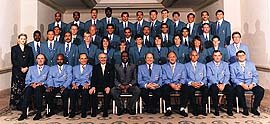
 |
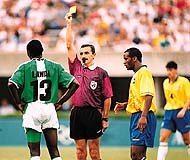 Referees were encouraged to keep things firmly under control from the very beginning. In total during the 48 games they showed the yellow card 180 times, the yellow/red combination 11 times, and the red card 7 times. |
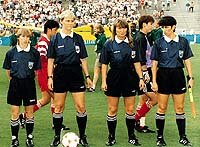 Five games in the women's tournament were officiated by a quartet of women referees. |
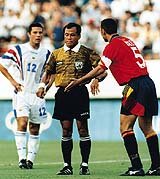 There's no point in arguing with the referee. This was a fact that the players simply did not always want to accept, even at Atlanta '96. |
In-depth work
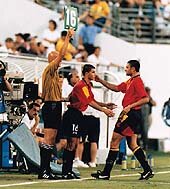 FIFA intends to redefine the role of the fourth referee. |
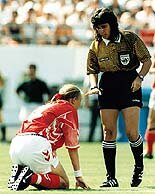 How severe is that injury? No easy judgement for a referee to make. |
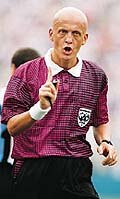 Pierluigi Collina (Italy), the referee during the final between Argentina and Nigeria. |
Women's tournament
| REFEREES AND ASSISTANT REFEREES | |||
|---|---|---|---|
| Referees | |||
 |
COLLINA Pierluigi |
 |
DALLAS Hugh |
| Italy 13.02.1960 Financial Advisor |
Scotland 26.10.1957 Company Director |
||
 |
GARCIA-ARANDA E. Josť |
 |
JONSSON Ingrid |
| Spain 03.03.1956 Physical Education Teacher |
Sweden 13.09.1959 Head Master |
||
 |
SKOGVANG Bente |
 |
UN-PRASERT Pirom |
| Norway 17.08.62 Research Assistant |
Thailand 16.11.1953 Civil Servant |
||
 |
AL-MUHANNA Omar Saleh Saad |
 |
RUSCIO Roberto Ruben |
| Saudi Arabia 10.01.1959 Civil Servant |
Argentina 18.09.1953 Bank Clerk |
||
 |
PEREIRA DA SILVA Antonio |
 |
VASCONCELOS GUEDES Claudia |
| Brazil 25.05.1957 Teacher |
Brazil 20.03.1963 Physical Education Teacher |
||
 |
EL-GHANDOUR Gamal Mahmoud |
 |
BOUCHARDEAU Lucian |
| Egypt 12.06.1957 Accountant |
Niger 18.12.1961 Administrator |
||
 |
ARCHUNDIA TELLEZ Benito |
 |
BAHARMAST Esfandiar |
| Mexico 21.03.1966 Businessman |
USA 11.03.1954 Engineer Analyst |
||
 |
DENONCOURT Sonia |
 |
LENNIE Edward |
| Canada 25.06.1964 Shop Owner |
Australia 05.10.1959 National Sales Manager |
||
| Assistant Referees | |||
 |
NEUENSTEIN Heiner |
 |
DUPANOV Yuri |
| Germany 25.04.1958 Business Management Graduate |
Belarus 07.06.1962 Businessman |
||
 |
UGURDUR Akif |
 |
HOLM Gitte |
| Turkey 07.10.1962 Civil Servant |
Denmark 26.07.1965 Laboratory Assistant |
||
 |
VIENNOT Nelly |
 |
JEON Young Hyun |
| France 08.01.1962 |
Korea Republic 26.02.1956 Lecturer |
||
 |
AL MOSSAWI Mohamed Ahmed |
 |
ARANGO CARDONA Jorge Luis |
| Oman 01.01.1959 Civil Servant |
Colombia 12.04.1958 Physical Education Teacher |
||
 |
VELAZQUEZ PINTOS Carlos Adan |
 |
DANTE Dramane |
| Uruguay 17.04.1953 Teacher |
Mali 09.12.1961 Printer |
||
 |
OSMAN M. HAMID Amir |
 |
KELLY Peter |
| Sudan 01.01.1955 Civil Servant |
Trinidad and Tobago 10.02.1962 Teacher |
||
 |
TORRES ZUNIGA Luis Fernando |
 |
RODRIGUEZ ROMAN Maria Del Socorro |
| Costa Rica 31.08.1958 Teacher |
Mexico 24.11.1965 Sports Manager |
||
 |
GETTEMEYER Janice |
 |
FRED Lencie |
| USA 27.08.62 Teacher |
Vanuatu 21.03.68 Builder |
||